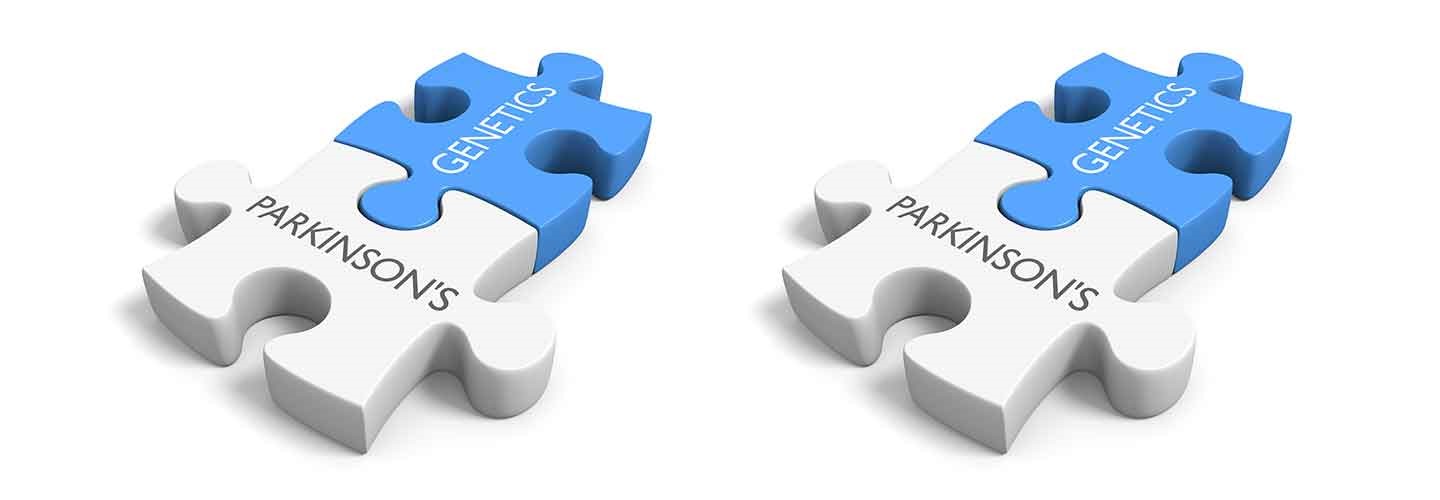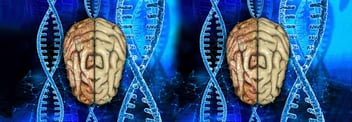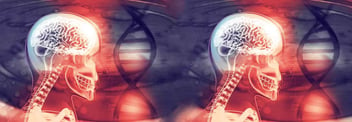Predicting Parkinson’s from a Single Gene? How Understanding your LRRK2 Gene Variant May Help You Prevent Parkinson’s Disease
- Home
- Blog

Reader, one of the greatest gifts in life is being able to experience the wonder of the world through the eyes of a child. As the father of two daughters, I fondly recall many moments when their faces would light up with the youthful wonder and joy of discovering something new. As a medical professional, I especially loved when they’d try to shock me with their scientific insights. One day, when my daughter was eight or nine, she dropped her book bag in the entryway and quickly ran up to me to proclaim, “Daddy! Did you know that your body completely replaces itself every seven years?! That means that seven years from now, you’ll have a whole new daughter!” I laughed and gave her a big hug—kids and adults alike continue to be amazed by pop-science factoid. Indeed, there is some truth to it: the billions of cells in our body each regenerate on their own timelines, with some—like sperm cells—regenerating every week, and others—like red blood cells—regenerate over the course of months. While the seven-year timeline may be a generalization, it is fair to say we are not the same physical specimen in any decade of our lives—with one crucial exception. Our neurons, the building blocks of nervous system including our brain and spinal cord, don’t regenerate. The neurons with which you’re born are the very same neurons you have at the time you die.
I explained this to my daughter at the time of her exclamation—not to be morbid, but to make her aware of the absolute necessity of taking care of those neurons, because once they start to degenerate, there’s no cure for what comes next. In fact, these important cells are the epicenter of some of the most painful processes one can suffer in their lifetimes: neurodegenerative diseases are infamous for how excruciatingly slowly they debilitate the body and the brain—they’re just as notorious for their incurability. For the last three weeks we’ve been focused on Alzheimer’s, the feared disease that slowly robs an individual of the functionality of their brain. Today, we’re going to shine the spotlight on another neurodegenerative disease—one that robs an individual of the functionality of their body and brain simultaneously. We’re going to talk about Parkinson’s Disease (PD) and Parkinson’s Dementia—and the cutting-edge science that suggests, like Alzheimer’s, perhaps its victims are not so randomized as we may have once believed. Perhaps genetics tells a larger story than we ever could have imagined.
Parkinson’s: Why This “Idiopathic” Disease May Not Be So Mysterious After All
Months ago, we traced the evolution of scientific thought regarding Alzheimer’s through time. If you can recall, the disease was once thought to be “idiopathic”, defined as that which arises “spontaneously or from an obscure or unknown cause.” Not so long ago, scientists believed there were no warning signs for this disease—and no genetic predispositions that might leave one individual more susceptible than someone with a slightly different genome. Since then, we’ve discovered that in fact, one of the principal causes of Alzheimer’s-related brain cell damage and death—namely the buildup of amyloid plaques in the brain—begin to manifest in the brain decades before diagnosis. We’ve also discovered that certain genes may play a significant role!
Just as scientists were in the dark as to why Alzheimer’s resulted in slow yet progressively severe cognitive decline until recently, they also remained stumped as to why Parkinson’s resulted in slow yet severe physical decline, with the body losing its ability to perform motor (and eventually non-motor) tasks until bed rest becomes the only means of comfort. For those who have been fortunate enough to have never encountered this debilitating disease, Parkinson’s, the result of the degeneration and death of nerve cells in certain key centers of the brain, causes tremors in an individual’s body, limb rigidity, balance and gait problems, and other physical impacts that over time significantly limit that individual’s ability to perform basic functions.
However, while most think of this disease as strictly physical, Parkinson’s can also take a significant toll on one’s mental functions. Non-motor symptoms of Parkinson’s can include apathy, depression, and trouble sleeping. Additionally, some individuals suffer from Parkinson’s Dementia, diagnosed “if the onset of dementia occurs a year or more after the onset of motor symptoms.” Symptoms include slowness of thinking, loss of memory and vocabulary, and other cognitive impairments in addition to physical ailments caused by Parkinson’s.
A sad example of this progression is the case of Robert*, who first presented for treatment at age 77. This well-respected professor came in complaining of anxiety, depression, and Parkinson’s Disease. While he had been divorced several times and had no emotional support at home, his girlfriend deeply cared about him and participated in his treatment. We performed Genomind Pharmacogenetic (PGx) Test and determined he had variations in his ANK3 and MTHFR genes, and so in addition to prescribing him fluoxetine to help his anxiety and depression, I recommended he take omega 3 and l-methylfolate supplements, and adopt a Mediterranean diet. Robert poorly adhered to these recommendations despite his girlfriend’s supporting them and began to develop paranoid thinking and visual hallucinations. When I last saw him, I recommended that he begin Nuplazid (pimavanserin), to treat his Parkinson’s psychosis (an antipsychotic medication specifically formulated to treat this condition), and he adamantly objected, and then dropped out of treatment and refused to come back despite my overtures.
How might we prevent such an outcome in others?
Now, new studies are beginning to tell a somewhat different picture. A genetic component to the disease was discovered less than two decades ago—and determining whether or not one has a mutation in a specific gene may have the power to significantly reduce the risk of one developing this painstaking disease.
LRRK2: Why Knowing About Your LRRK2 Gene is Vital to Your Understanding of Parkinson’s
Parkinson’s Dementia and Alzheimer’s are two different diseases caused by two different biological processes—the genes that predict the onset of Alzheimer’s likely have no bearing on Parkinson’s. In other words, the dementia that occurs simultaneously with Parkinson’s is possibly a direct consequence of Parkinson’s itself.
That said, scientists now understand that genetics play a role in Parkinson’s in approximately 10% of all individuals who suffer from the disease—and, while many genes have been linked to PD, the gene that is most commonly responsible for those cases is LRRK2. This gene codes for an enzyme known as leucine-rich repeat kinase 2, which “modifies other protein’s activities, including signaling, replication and gene expression.” A variant on this gene can lead to higher enzyme activity, which in turn may lead to an accumulation of alpha-synuclein aggregates inside your neurons, which damages and destroys them. These aggregates are a hallmark of Parkinson’s. There are also a number of other possible mechanisms related to how LRRK2 causes the brain cell degeneration. Certain portions of the population have a far greater chance of carrying a mutation on this gene—including Ashkenazi Jews, North African Arab Berbers, and Basque (see this link for more information.) However, research being done on how to modify the LRRK2 gene’s expression to inhibit enzyme activity may have a positive impact on finding a cure for those diagnosed with the LRRK2 mutation.
Luckily for us, a simple gene test can tell us if we may be at greater risk of developing Parkinson’s later in life. And just as I told my daughter years ago, this is crucial information for us to have because of the non-regenerative properties of our neurons. The sooner we understand the risks, the sooner we can start to protect these cells right now.
So how, exactly, do we protect our vulnerable neurons from the damage and eventual cell death that accompanies Parkinson’s? New research states it could be as straightforward as drinking your morning beverage. An analysis of 26 studies has shown that caffeine consumption has been found to reduce the odds of developing Parkinson’s by nearly 25%, with a linear relationship observed between levels of caffeine exposure and Parkinson’s risk. If you don’t like coffee, then how about a cup of tea? Green and black teas are rich sources of polyphenols, including EGCG, that have been shown to prevent motor dysfunction in an LRRK2 animal model of Parkinson’s disease. These polyphenols prevent neurodegeneration—just what we’re looking to do to keep our brain cells healthy and functional well into the future. There are a number of other nutritional factors that can increase or decrease the risk or progression of PD. For example, large consumption of dairy products may increase the risk; while intake of fruits, vegetables, and the DHA component of Omega 3 may all decrease the risk.
***
Reader, our bodies are extremely well adapted to change. The beautiful processes that allow our cells to regenerate are the very same processes that make epigenetics possible, as well as so many other bodily functions we normally never have to think about. It’s easy to take our continuous rejuvenation for granted—but our neurons don’t get that special gift, and the more we understand that—and understand the genetic components that could lead to future neuronal damage in our nervous system—the better equipped we will be to change our habits and save our health.
Related Information
- Learn about Genetic Testing
- Learn about Potomac Psychiatry
- Meet Our Doctors
- Contact Potomac Psychiatry
.png?width=144&height=144&name=Untitled%20design%20(34).png)



